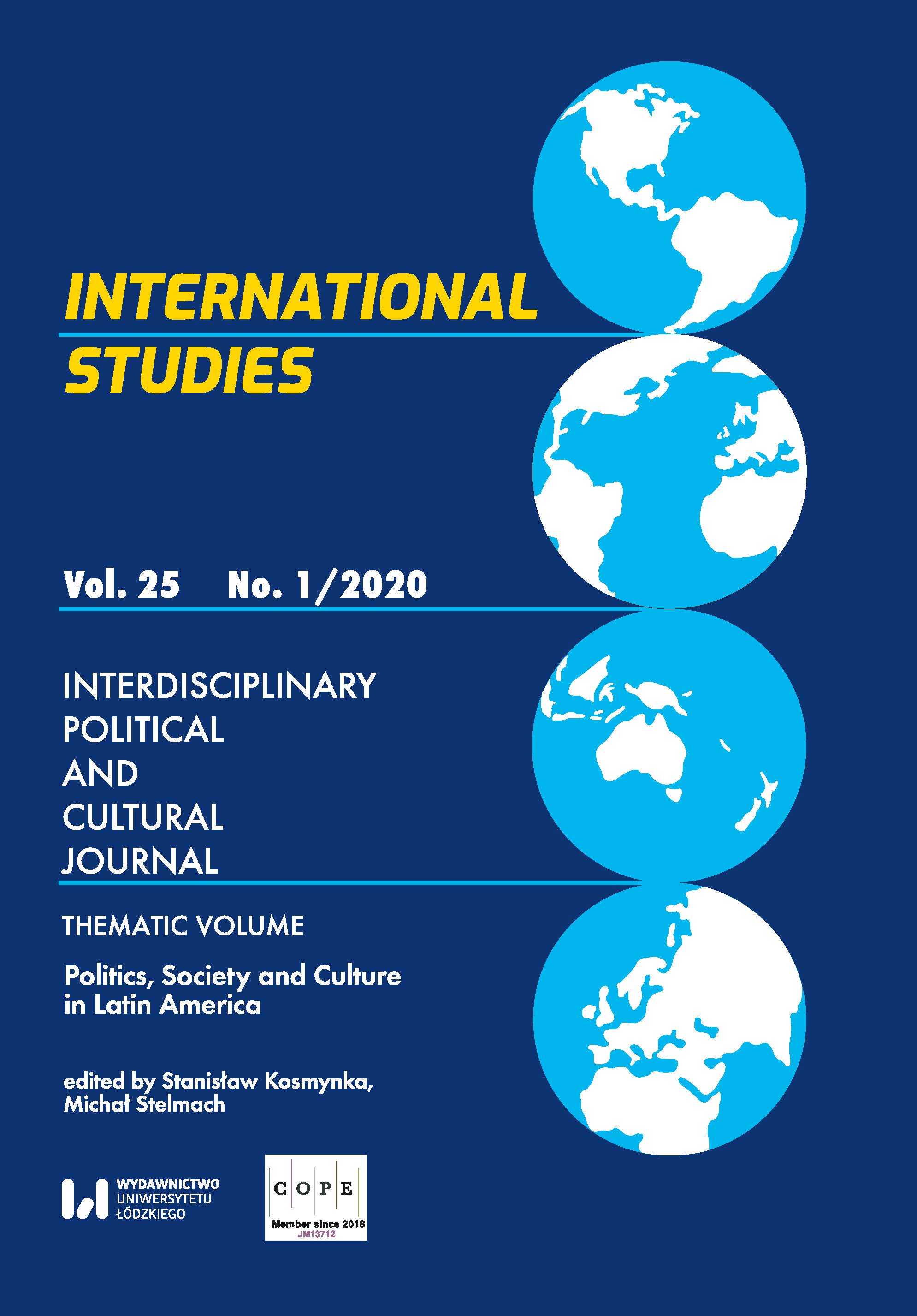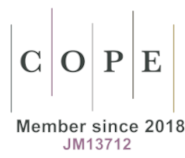Latin America: The Region without Catalonia
DOI:
https://doi.org/10.18778/1641-4233.25.07Keywords:
Latin America, Separatism, Secession, Catalonia, The South is My Country, O Sul é o Meu PaísAbstract
The aim of this article is to analyse the issue of “weak separatism” in Latin America as well as to give an answer to the question why there are no significant separatist movements in this region. The authors provide the definitions of separatism and secessionism as well as an explanation of these phenomena. Moreover, they present an overview of historical and contemporary separatist movements in Latin America. Based on Horowitz’s theory of ethnic separatism, the authors attempt to analyse the separatist movement “The South is My Country” in Brazil and compare it with separatism in Catalonia in Spain, where a referendum on independence from Spain was held in 2017, serving as an impetus for a similar referendum that took place in the South of Brazil. In spite of similar goals of these two separatist movements, the authors argue that there are significant differences in their nature, which are determined by the history and culture of the respective countries.
Downloads
References
Balcells, A. Catalan Nationalism: Past and Present. New York: St. ’Martin’s Press, Inc., 1996.
Google Scholar
DOI: https://doi.org/10.1007/978-1-349-24278-8
Biermann, R. “Secessionism, Irredentism and EU Enlargement to the Western Balkans. Squaring the Circle?” European Integration and the Transformation. Europeanization or Business as Usual? Ed. A. Elbasani, London–New York: Routledge, 2013, pp. 157–169.
Google Scholar
Brazil – GDP per capita. “Index Mundi.” Web. 20 January 2019 https://www.indexmundi.com/facts/brazil/gdp-per-capita
Google Scholar
Brazil’s Constitution of 1988 with Amendments through 2017. Web. 10 January 2019 https://www.constituteproject.org/constitution/Brazil_2017.pdf?lang=en
Google Scholar
Carmagnani, M. (Ed.), Federalismos latinoamericanos: México, Brasil, Argentina. Ciudad de México: Fondo de Cultura Economica, 2016.
Google Scholar
Conversi, D. The Basques, the Catalans, and Spain: Alternative Routes to Nationalist Mobilisation. London: Hurst & Company, 1997.
Google Scholar
Cuadras Morató, X. Catalonia: A New Independent State in Europe?: A Debate on Secession within the European Union. London–New York: Routledge, 2016.
Google Scholar
DOI: https://doi.org/10.4324/9781315740584
Dearden, L. “Catalan Referendum: Clashes with Police Leave Nearly 900 Injured.” The Independent (2 October 2017). Web. 14 December 2018 https://www.independent.co.uk/news/world/europe/catalan-referendum-police-clashesviolence-900-injured-government-independence-vote-banned-latest-mossos-a7978166.html
Google Scholar
Dugard. J., The Secession of States and Their Recognition in the Wake of Kosovo. The Hague: The Hague Academy of International Law, 2013.
Google Scholar
DOI: https://doi.org/10.1163/9789004257498
EconoArs, “Nuestras Cataluñas: regiones independentistas de América Latina.” (2 October 2017). Web. 21 January 2019 https://www.econoars.com/blog-magazine/nuestras-catalunas-regiones-independentistas-de-america-latina
Google Scholar
El nacionalismo catalán, explicado en cuatro minutos. Video. Madrid: El País, 2017. Web. 14 December 2018 https://elpais.com/elpais/2017/10/09/videos/1507575236_214157.html
Google Scholar
Fradera, J. M. “El proyecto liberal catalán y los imperativos del doble patriotismo.” Ayer 35 (1999): 87–100.
Google Scholar
García Romero, L. “¿Focos secesionistas en América Latina?“ (2 November 2017) Estudios de Politica Exterior. Web. 10 January 2019 https://www.politicaexterior.com/focos-secesionistas-en-america-latina/
Google Scholar
Gawrycki, M. F., Między autonomią a zależnością: polityka zagraniczna państw Ameryki Łacińskiej i Karaibów – stadium przypadków, Warszawa: ASPRA-JR, 2017.
Google Scholar
Giorgi, J. “¿Y el separatismo en América Latina?” El Observador, (5 October 2017). Web. 21 December 2018 https://www.elobservador.com.uy/nota/-y-el-separatismo-en-america-latina--2017105500
Google Scholar
Hale, H. E., The Foundations of Ethnic Politics. Separatism of States and Nations in Eurasia and the World. Cambridge: Cambridge University Press, 2008.
Google Scholar
DOI: https://doi.org/10.1017/CBO9780511790669
Haverland, C. “Secession.” Encyclopedia of Public International Law. Vol. 4, Amsterdam: North-Holland, 2000.
Google Scholar
Hobsbawm, E. J. “Nacionalismo y nacionalidad en América Latina.” Repensando la subalternidad. Miradas críticas desde / sobre América Latina. Ed. P. Sandoval, Lima: Instituto de Estudios Peruanos, 2009.
Google Scholar
Homicide Monitor. Web. January https://homicide.igarape.org.br/
Google Scholar
Horowitz, D., Ethnic Groups in Conflict. Berkeley: University of California, 2008.
Google Scholar
Instituto Brasileiro de Geografia e Estatistica. “Contas regionais do Brasil.” Web. 18 January 2019 https://www.politicaexterior.com/focos-secesionistas-en-america-latina/ ; https:/www.ibge.gov.br/estatisticas-novoportal/economicas/contas-nacionais/9054-contas-regionais-do-brasil.html?=&t=resultados&fbclid=IwAR2lJOOt1_DB7EV8mLznM6W2f6lumYgKKh2SLtDFVJjvKavCZyv2wmTAcDY
Google Scholar
Kalinowski, Ł. “Prawne aspekty secesji Katalonii.” Internetowy Przegląd Prawniczy TBSP UJ 3 (2016): 183–85.
Google Scholar
Kark, C. “From Parlor to Politics: Catalan Romantic. Nationalism as a Bourgeois Political Instrument.” LL Journal 2 (2007). Web. 14 December 2018 https://lljournal.commons.gc.cuny.edu/2007–2-kark-texto/
Google Scholar
Lasuén J. R. “El estado multiregional.” La España de las autonomías. Ed. F. Fernández Rodríguez; M. Ferrer Regales, Madrid: Instituto de Estudios de Administración Local, 1985.
Google Scholar
Lomnitz, C. “Nationalism as a practical system: Benedict Anderson’s theory of nationalism from the vantage point of Spanish America.” The Other Mirror: Grand Theory through the Lens of Latin America. Eds. M. A. Centeno, F. Lopez-Alves, Princeton: Princeton University Press, 2001.
Google Scholar
Łaciński, P. „Wyzwania i uwarunkowania stabilności geopolitycznej Ameryki Łacińskiej.” Ameryka Łacińska. Kwartalnik Analityczno-Informacyjny 3 (2017): 5–17.
Google Scholar
Mroziewicz, R., Stemplowski, R. (Eds.). Dzieje Ameryki Łacińskiej, t. 2, Warszawa: Książka i Wiedza, 1979.
Google Scholar
Mroziewicz, R., Stemplowski, R. (Eds.). Dzieje Ameryki Łacińskiej, t. 3, Warszawa: Książka i Wiedza, 1983.
Google Scholar
Paleczny, T. Rasa, etniczność i religia w brazylijskim procesie narodowotwórczym. Kraków: Universitas, 2004.
Google Scholar
Pérez, P. “1,8 millones de personas votan por la independencia catalana en el 9-N.” El País (10 November 2014). Web. 14 December 2018 https://elpais.com/politica/2014/11/09/actualidad/1415542400_466311.html
Google Scholar
Phillips, D. “A half-million Brazilians want to break away and form a new country.” (6 October 2017). Financial Times. Web. 17 January 2019 https://www.washingtonpost.com/news/worldviews/wp/2016/10/05/half-a-million-brazilians-want-to-break-away-and-form-a-new-country/?utm_term=.142a60c2a7df
Google Scholar
Reid, M. “Why Latin America Has No Serious Separatist Movements.” The Economist (21 November 2017). Web. 14 December 2018 https://www.economist.com/the-americas/2017/11/23/why-latin-america-has-no-serious-separatist-movements
Google Scholar
Romei, V. “Catalonia’s Economic Strength Fuels Independence Push.” Financial Times (28 September 2017). Web. 14 December 2018 https://www.ft.com/content/62118282-a35a-11e7-b797-b61809486fe2
Google Scholar
Rudowski, T. “Koncepcja “ponownego założenia państwa”: przypadek Boliwii.” Społeczeństwo i Polityka: pismo edukacyjne 1 (2017): 39–54.
Google Scholar
Rudowski, T. “Vías a la modernidad. Noción y concepto de desarrollo en América Latina: un marco teórico.” Globalizaciόn y desarrollo sostenible. Eds. M. Czerny Mirosława, C. A. Serna Mendoza. Warsaw: Wydawnictwa Uniwersytetu Warszawskiego, 2018.
Google Scholar
DOI: https://doi.org/10.31338/uw.9788323535102.pp.69-82
Sánchez, E. “El fantasma de Cataluña y los separatismos en América Latina.” (27 October 2017). Web. 21 December 2018 https://laopinion-digital.com/opinion/fantasma-cataluna-los-separatismos-america-latina/27-10-2017
Google Scholar
Schipani, A. “Brazilians asked to vote on secession move.” Financial Times (6 October 6 2017). Web. 17 January 2019 https://www.ft.com/content/fcdf6460-aa52–11e7-ab55–27219df83c97
Google Scholar
Sieniawski, P., “Secesia v súčasnom medzinárodnom práve” Právník 10 (2017): 894–914.
Google Scholar
Sil, R. and Katzenstein, P. J. Beyond Paradigms: Analytic Eclecticism in the Study of World Politics. Basingstoke: Palgrave Macmillan, 2010.
Google Scholar
DOI: https://doi.org/10.1007/978-1-137-01359-0_1
Siroky, D., “Explaining Secession”. The Ashgate Research Companion to Secession. Eds. A. Pavković, P. Radan. Farnham: Ashgate Publishing Ltd, 2011.
Google Scholar
Torres, D. “Catalan leader rebuffs Madrid’s offer on more autonomy.” Politico (9 May 2018). Web. 14 December 2018 https://www.politico.eu/article/catalan-leader-rebuffs-madrids-offer-on-more-autonomy/
Google Scholar
Ucelay-da Cal, E., Breve historia del separatismo catalán. Barcelona: Ediciones B, 2018.
Google Scholar
Vergara Paniagua, P. “Conflicto regional, estado central y sociedad periférica en Bolivia y Perú. Un análisis histórico comparado.” Université de Montréal / Département de Science Politique (2012). Web. 21 December 2018 https://papyrus.bib.umontreal.ca/xmlui/bitstream/handle/1866/8782/Vergara_Alberto_2012_these.pdf
Google Scholar
Vilar, P. Historia de España. Paris: Librarie Espagnole, 1963.
Google Scholar
Wood, J. R., “Secession: A Comparative Analytical Framework.” Canadian Journal of Political Science 1 (1981): 107–34.
Google Scholar
DOI: https://doi.org/10.1017/S000842390003537X
Woolard, K. A. Double Talk: Bilingualism and the Politics of Ethnicity in Catalonia. Stanford: Stanford University Press, 1989.
Google Scholar
Downloads
Published
How to Cite
Issue
Section
License

This work is licensed under a Creative Commons Attribution-NonCommercial-NoDerivatives 4.0 International License.

















